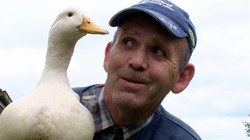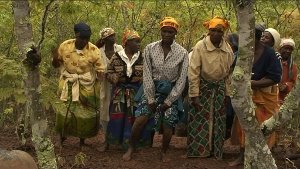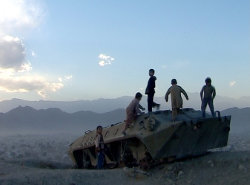LOVE STORY
Česká republika, 2011, 50 min
Petra Ludvíková
27.01.2012 21:15
 Desmond Love is a mature man and feels and behaves so. He likes to smoke his pipe and looks after his ducks. Men usually like talking about cars and Dessy´s favourite subject are his two shopping-trolleys. He parks them in front of his house nad likes to enhance them with various details. Desmond is one of the residents at Camphill Clanabogan, that means a person with mental handicap. In the scope of a therapy, he learns how to write on a computer. He writes his own story. This documentary amended with short cartoons let us glimp into Dessys´s memories – word after word, exactly as he remembered them. At the same time, we have got a chance to see Dessys´s home and everyday-life of Camphill community with its permanent inhabitants: mentally disabled people, young volunteers and people, who control and administrate the home.
Desmond Love is a mature man and feels and behaves so. He likes to smoke his pipe and looks after his ducks. Men usually like talking about cars and Dessy´s favourite subject are his two shopping-trolleys. He parks them in front of his house nad likes to enhance them with various details. Desmond is one of the residents at Camphill Clanabogan, that means a person with mental handicap. In the scope of a therapy, he learns how to write on a computer. He writes his own story. This documentary amended with short cartoons let us glimp into Dessys´s memories – word after word, exactly as he remembered them. At the same time, we have got a chance to see Dessys´s home and everyday-life of Camphill community with its permanent inhabitants: mentally disabled people, young volunteers and people, who control and administrate the home.
Petra works as a Project manager of Palace Akropolis and also as a moderator of Radio 1. She organises culture events, foreign concerts, music workshops etc. In the past, she worked as e.g. editress of genre programmes on TV Óčko and in the production of annual film awards Český lev organised by a production company VAC. Love Story is her film debut which she made in cooperation with experienced cameramen Martin Čech, mister of sound Petr Stýbl and an editor Lucie Haladova. It Camphill Clanabogan, where the film takes place, at first she spent 3 months as a volunteer.
Director and production: Petra Ludvíková
Language of dialogies: English
Language of subtitles: Czech

 „Ritual reversals“ or „ritual of rebellion“ are concepts used for mock rituals performend in Southern and Eastern Africa. During fertility rituals, like rain making ceremonies, women in their songs and dances demonstrate obscene behaviour while they behave like men. These are secret performance open strictly for eldery men and women. Still, we were invited to record the rain making ceremony in the land of Chief Chassuka, Manika Province in Mozambique in order to document the ritual for the younger generations. These rituals are a fading tradition probably due to the special character of the songs and dances.
„Ritual reversals“ or „ritual of rebellion“ are concepts used for mock rituals performend in Southern and Eastern Africa. During fertility rituals, like rain making ceremonies, women in their songs and dances demonstrate obscene behaviour while they behave like men. These are secret performance open strictly for eldery men and women. Still, we were invited to record the rain making ceremony in the land of Chief Chassuka, Manika Province in Mozambique in order to document the ritual for the younger generations. These rituals are a fading tradition probably due to the special character of the songs and dances. Lal, a remote bazaar surrounded by the high mountains of the Western Hindu Kush in Central Afghanistan, struggles to find peace after more than 30 years of war. Everyday life in these harsch wintery surroundings don't seem to leave much space to deal with the new situation. Former Mujaheddin Commanders, religious leaders and newly elected state officials each have their respective views of this new system called 'democracy'. In this film these different actors tell us about their past, explain their respective views on the democratic changes and reveal their individual expectations for the future.
Lal, a remote bazaar surrounded by the high mountains of the Western Hindu Kush in Central Afghanistan, struggles to find peace after more than 30 years of war. Everyday life in these harsch wintery surroundings don't seem to leave much space to deal with the new situation. Former Mujaheddin Commanders, religious leaders and newly elected state officials each have their respective views of this new system called 'democracy'. In this film these different actors tell us about their past, explain their respective views on the democratic changes and reveal their individual expectations for the future.